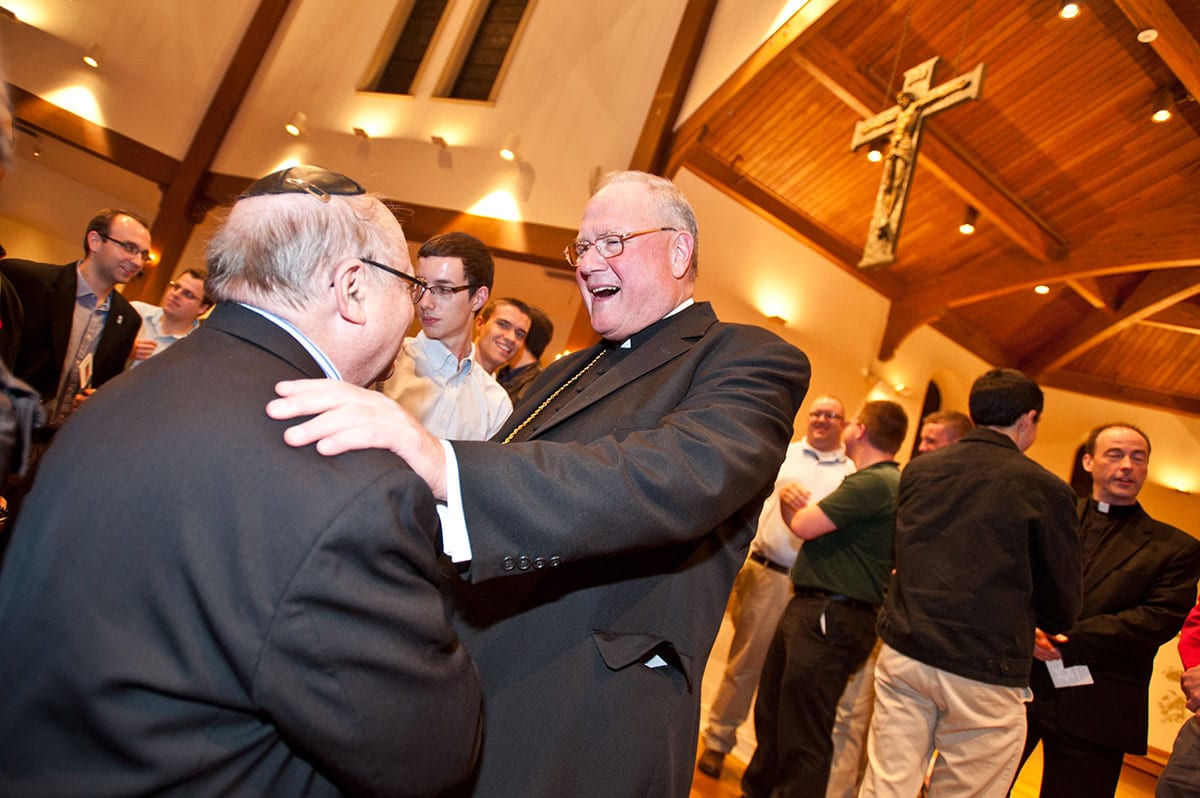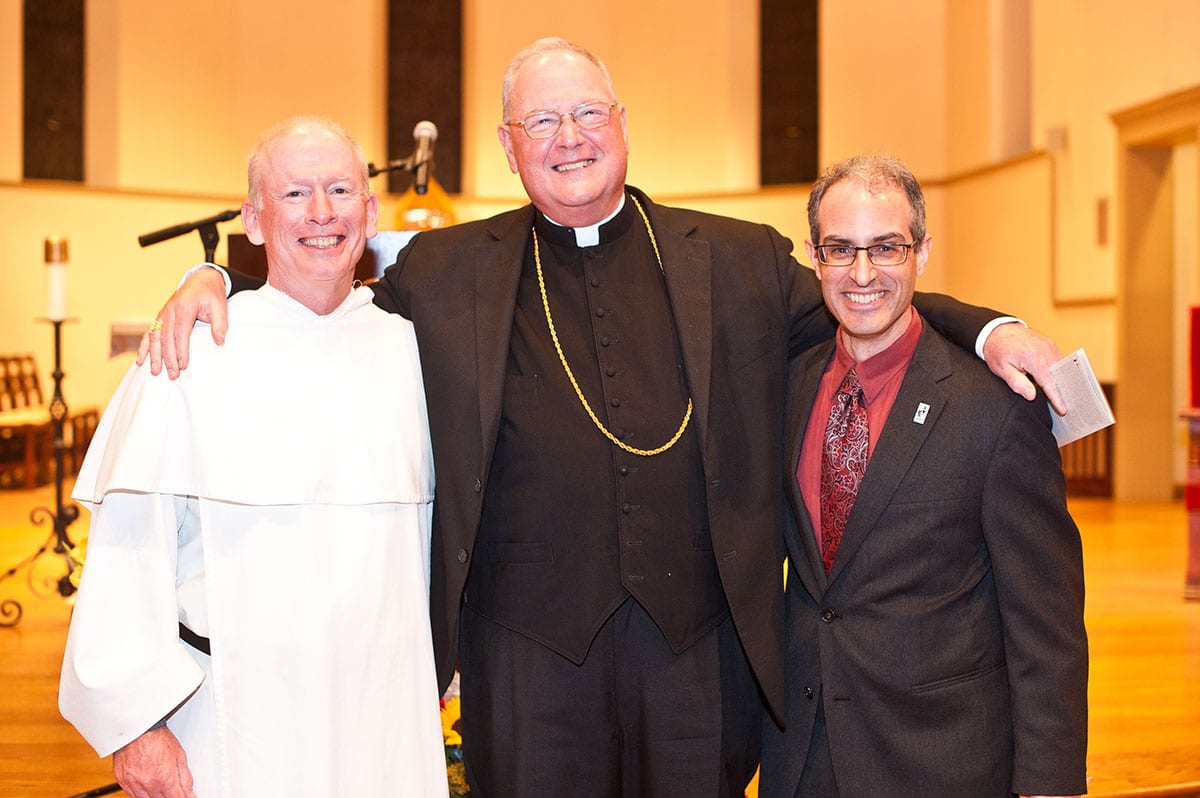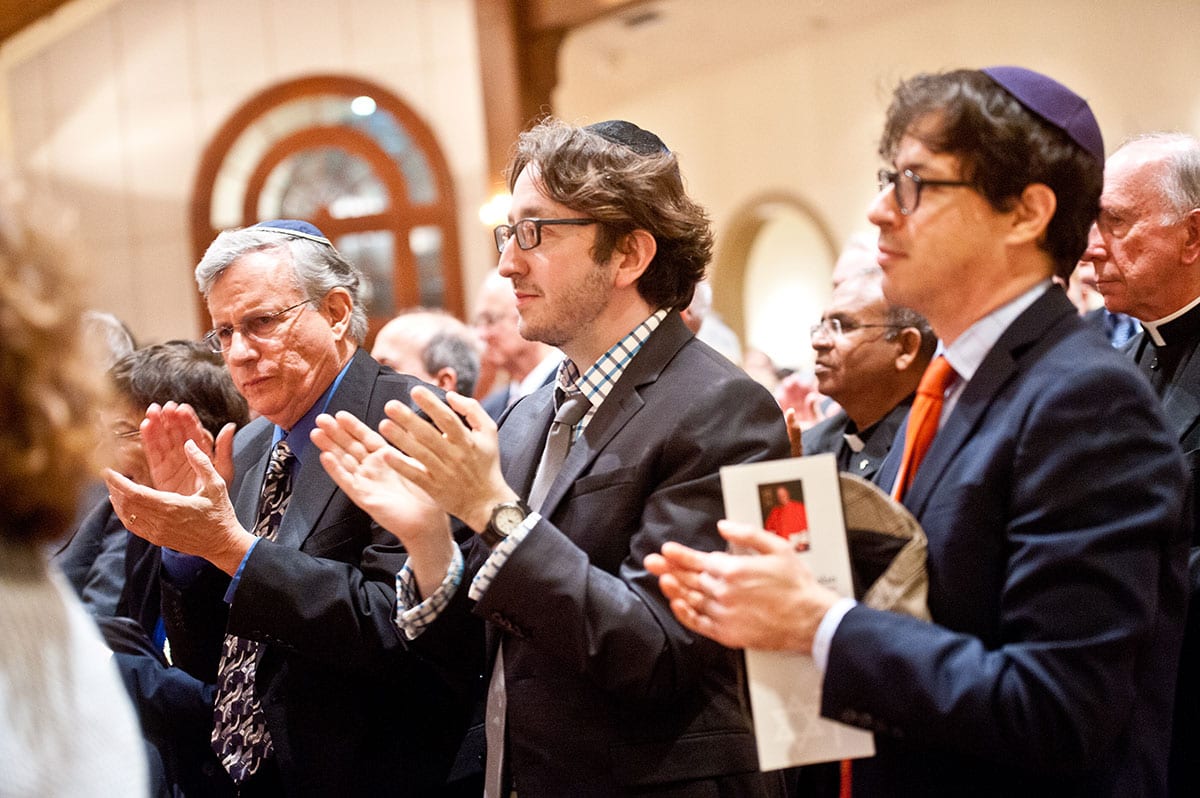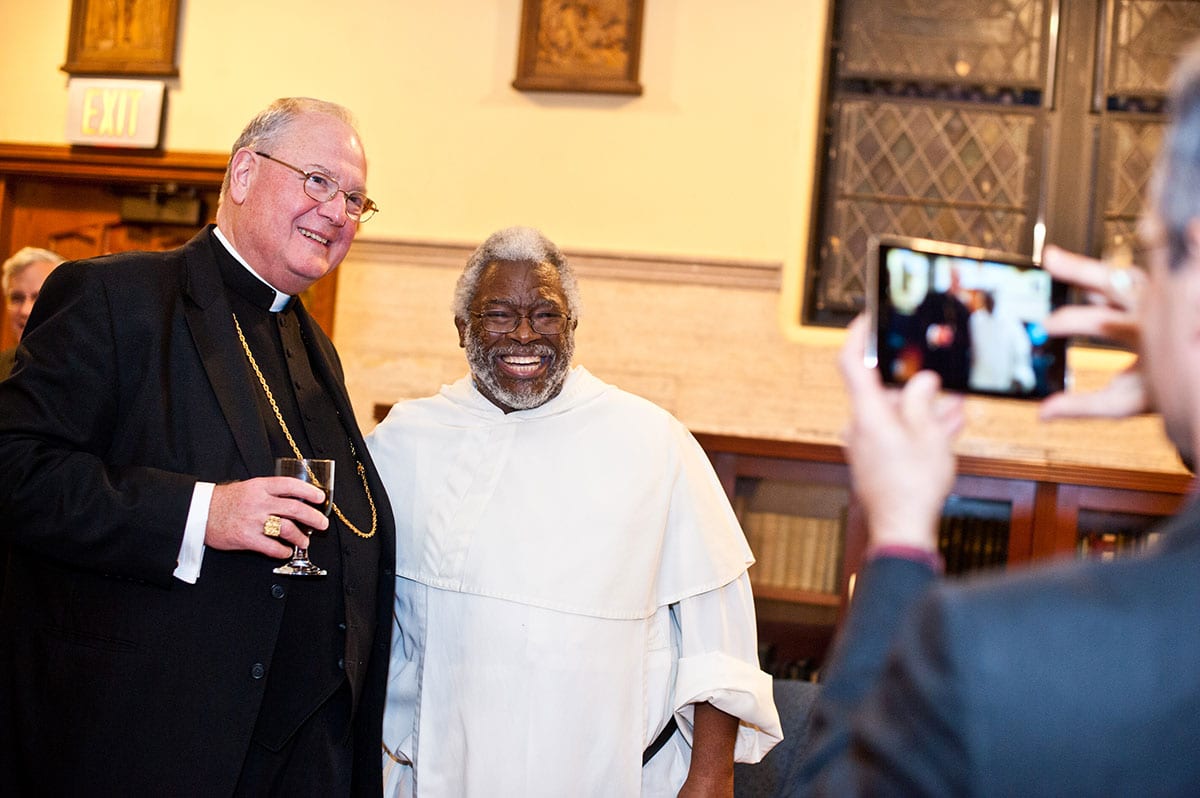November 09, 2016
Cardinal Dolan praises John Paul II’s role in advancing Catholic-Jewish relations

By VICKI-ANN DOWNING
The Providence College Theological Exchange Between Catholics and Jews, which hosts a speaker every fall on interfaith themes, welcomed a rock star on Nov. 3 in conjunction with the College’s year-long centennial celebration: Timothy Cardinal Dolan, archbishop of New York.
Ten days before, Cardinal Dolan was seated between presidential candidates Hillary Clinton and Donald Trump at the Alfred E. Smith Foundation Memorial Dinner in New York. He has shared a stage with comedian Stephen Colbert. The New York Times has described Cardinal Dolan as “big, earthy, unexpected, and frequently funny,” calling his humor “self-deprecating and unselfconscious.”
It didn’t take long for Cardinal Dolan’s wit to register with the audience of more than 600 who filled St. Dominic Chapel. In addition to students, faculty, staff and PC’s Dominican community, they included alumni, area priests and rabbis, and seminarians from the Diocese of Providence.
“Look at this crowd. I don’t know about our Jewish friends, but we Catholics would call this a two-collection crowd,” Cardinal Dolan quipped.
A native of Ballwin, Mo., Cardinal Dolan was ordained to the priesthood for the Archdiocese of St. Louis in 1976. After earning a doctorate from The Catholic University of America, he taught at Kenrick-Glennon Seminary in St. Louis and at St. Louis University. In 1994, he went to Rome to be rector of the Pontifical North American College while also teaching at the Pontifical Gregorian University and the Pontifical University of St. Thomas Aquinas, the Angelicum. Pope Benedict XVI named him archbishop of New York in 2009 and appointed him cardinal in 2012.
Cardinal Dolan’s presentation, “Jewish-Catholic Dialogue: 2,000 Years but Just Beginning,” discussed Nostra Aetate, the Second Vatican Council document that opened relations between the Catholic Church and non-Christian religions. Nostra Aetate, which marked its 50th anniversary last year, has been the focus of the lecture series of the Catholic-Jewish Theological Exchange for the past three years, said Dr. Arthur P. Urbano, Jr., assistant professor of theology and chair of the theological exchange committee since its founding in 2007.

College President Rev. Brian J. Shanley, O.P. ’80 called Cardinal Dolan “one of the pre-eminent players” in Jewish-Catholic dialogue today. He is co-chair of the interfaith dialogue group of the U.S. Conference of Catholic Bishops and the National Council of Synagogues. Rabbi Wayne Franklin, senior rabbi at Temple Emanu-El in Providence and a past presenter at the theological exchange, also is a member and attended the PC presentation.
“Providence College was founded 100 years ago to be a place of opportunity for people for whom education wasn’t always an open door,” said Father Shanley. Most were the sons of immigrant Catholics, but the College also was “a place of opportunity for Jewish students. Tonight we celebrate that community we have had since our founding with our Jewish brothers and sisters,” Father Shanley said.
Cardinal Dolan credited Saint John Paul II, as pope from 1978-2005, with playing a “monumental role” in bringing Nostra Aetate to fruition. John Paul II grew up in a Poland that was destroyed by two world wars, then occupied by a communist and atheist regime. By the time he was in his early 20s, he had lost his father, mother, sister, and brother. During World War II, he “lived in daily peril for six bleak years watching Jewish friends, and his own classmates in the secret seminary in the basement of the cardinal archbishop’s house, disappear nightly.”
“John Paul II believed that the most mortal toxin infecting the human project was the denial of God’s sovereignty, the denial even of his existence,” Cardinal Dolan said. “The Church’s most natural ally in facing this challenge was the Jews. Humanity’s preference of late to ‘get along just fine without God’ — to use Rabbi Jonathan Sacks’ definition of secularism — was deadly, and must be reversed. The pope believed that the Jewish community would share his sense of urgency.”
In June 1979, just months after becoming pope, John Paul II celebrated Mass at Victory Square in Warsaw. Within minutes, he was interrupted by a chant from the crowd that began slowly, spread like a tsunami, and continued for a full 10 minutes.
“Two million Poles shouted the same three words — ‘We want God!’ ‘We want God!’ — the primitive cry of faith, of belief, of humanity’s innate longing for the divine — a thirst denied, ignored, ridiculed, outlawed, and reasoned away for too long by the lies of a society and culture that had vainly sought purpose in systems and mentalities that forgot God,” Cardinal Dolan said.
The American author George Weigel said the pope looked “right into the eyes … of this great humanistic project, in which the God of the Hebrew and Christian Bible came to be regarded as the enemy of human maturation and liberation, and did not blink,” Cardinal Dolan said.
“In the pervasive world view of atheistic humanism (and) secularism, created by such thinkers as Kant, Feuerbach, Marx, and Nietzsche, biblical religion was the enemy, for it impeded the progress of humanity,” Cardinal Dolan said. “John Paul’s cause, then, was to rally Christians and Jews together to shout out, ‘We want God!’”
“I would dare suggest to you that John Paul II realized the dream of Nostra Aetate … by trusting the Jewish community enough to invite them to what was indeed the number one priority of his pontificate — to recover the primacy of the spiritual,” Cardinal Dolan said.

Cardinal Dolan said Catholics and Jews share common beliefs about the dignity of the human person and the sanctity of life, a trust in reason as an ally to faith, and an allegiance to God’s law, “truths written on the human heart before being engraved in stone.”
Each believes that “faith, while deeply personal, is never private. Our interior convictions … have social, public implications,” Cardinal Dolan said. “Our religion is not confined to the sanctuary of the parish or the bimah of the synagogue, but spills out to the public square.”
When Cardinal Dolan finished his presentation, he was given a standing ovation. He took several question from the audience, including one about the recent UNESCO resolution that failed to acknowledge the Temple Mount and Western Wall in Jerusalem as holy sites in Judaism.
“Two religious groups who have been treated with less than dignity by the United Nations would be Jews and Catholics,” Cardinal Dolan said.
Asked about the future of Israel, Cardinal said, “Now folks, hear me say this: In our combat of systemic genocide against Christians throughout the world, we have no stronger allies than the American Jewish community.”
He said that in the future, he hopes the focus of Nostra Aetate will shift to include relations with Islam and with the Eastern rite of the Christian churches.
At the end of his question-and-answer session, Cardinal Dolan was again met with a standing ovation. He stayed a while longer to sign autographs, bless rosaries, and talk with guests.
“This is a real person,” said Arthur Fixler of Cranston, who is Jewish and attended the event with a friend, Maxine Goldin of Providence. She called Dolan’s presentation “wonderful. I love that they brought him in.”







